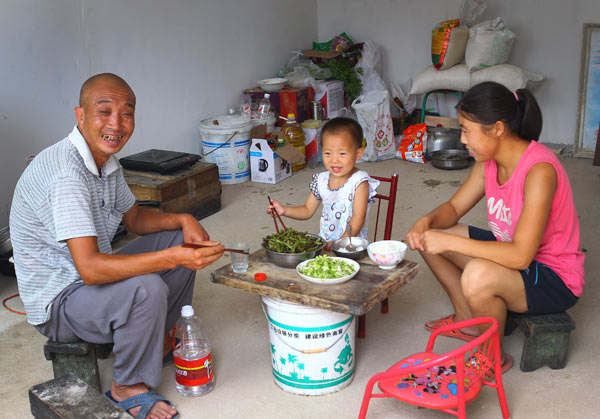Temporary house is now home
Updated: 2012-08-07 07:53
By Zheng Jinran and Wang Qingyun (China Daily)
|
|||||||||||
Villagers whose homes were damaged by flooding in Beijing's rural Fangshan district began to move in to temporary housing on Monday, and the process will be completed by Friday.
 |
|
Fifty-year-old Wang Zhiguang (left), his grandson Wang Ruiyao and his daughter-in-law Zhang Yumei have lunch at a temporary house built for them by the local government in Beijing's Fangshan district on Monday. Floods damaged their house on July 21. Zou Hong / China Daily |
"It's very good, beyond our expectation," said Wang Yufu, 58, whose house was damaged during the torrential rains. His family of six moved to three temporary houses in Hongsi village on Monday.
"Cars were sent to help us move in the early morning," he said, sitting on his new bed.
Every temporary house on the Hongsi village site, with an average size of 20 square meters, has two single beds, a desk, a table and a closet. Each kitchen and bathroom are shared by 35 families, according to the site's constructer Beijing Urban Construction Group.
Every 50 temporary houses are required to have a shared area with a kitchen and bathroom, according to guidelines issued by the municipal government recently.
"But in some small sites with 10 or 20 makeshift houses, the standard will have some variations. All we insist on is ensuring that the residents' life is convenient," said Liu Haiqi, a publicity official for the Beijing Municipal Commission of Housing and Urban-Rural Development.
"Food has been allocated for us by the village government," said Wang. "We can cook now. We cannot believe that would happen in such a short period."
Sun Shu, an official in charge of the temporary housing community of Hongsi, said 419 families from four villages will move in by Friday. "They will pay for the electricity but the drinking water is free."
In addition, a medical clinic, shop and a small police station have been built. A large recreational area with new exercise equipment has also been located in the middle of this new community in Hongsi, where 966 makeshift houses with white walls and red roofs stand in line. It is the largest among the 44 sites in Fangshan district.
The large mountainous area of Fangshan suffered more damage than other districts in Beijing on July 21 during the heaviest rainfall in 61 years, which caused 79 deaths.
In the temporary site of Yancun township, Du Guiliang and his family have spent a night in their temporary house. He got two rooms for his family.
"I will buy more beds, making my new house comfortable for the coming years," said Du. He said he is satisfied with the living conditions now but had to spend a night in his friend's apartment because his family of five didn't prepare enough beds.
Some residents will live in temporary housing for three years until their new homes are completed. In Fangshan, those who lost their houses will get new, permanent houses of up to 200,000 square meters.
The district has also been working to maintain hygiene standards.
Yang Dongli, director of the district health bureau, said authorities have finished inspecting the quality of the sources of drinking water for more than 400 villages.
"Water wells in many villages were damaged on July 21 because their disinfecting apparatus was destroyed by the flood," said Yang. "Now the water authority of the district is installing new disinfecting apparatus. Hopefully, they will be finished by mid-August. Now the medical workers are disinfecting them on a regular basis.
"We don't allow people to drink water whose quality has not been tested, or has been tested and failed. Those who cannot drink from their usual water sources will get clean drinking water from district authorities."
The district also has finished a round of disinfection of all its residential communities, said Yang. "There have been no reports of outbreaks of water-borne diseases since the flood. The hospitals and other medical centers report every case of such diseases to the district's center of disease control and prevention, and we find the number is similar to those of past years."
Contact the writers at zhengjinran@chinadaily.com.cn and wangqingyun@chinadaily.com.cn
Related Stories
Pavement collapses in heavy rains 2012-08-02 07:41
Beijing flood death toll hits 77 2012-07-27 08:03
Volunteers clear debris in Fangshan 2012-07-28 16:55
Online sales of safety hammers soar 2012-07-25 07:55
Capital flood's aftermath 2012-07-23 17:01
China allots 120m yuan to fight floods 2012-07-22 20:33
Today's Top News
President Xi confident in recovery from quake
H7N9 update: 104 cases, 21 deaths
Telecom workers restore links
Coal mine blast kills 18 in Jilin
Intl scholarship puts China on the map
More bird flu patients discharged
Gold loses sheen, but still a safe bet
US 'turns blind eye to human rights'
Hot Topics
Lunar probe , China growth forecasts, Emission rules get tougher, China seen through 'colored lens', International board,
Editor's Picks

|

|

|

|

|

|





